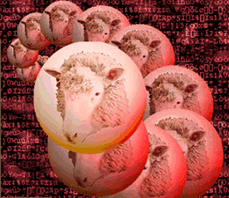80-136
Social Structure, Public Policy & Ethical Dilemmas
Home
Synopsis
Materials
Requirements
Projects
Unit I Schedule
Unit II Schedule
Unit II Schedule
External Links
Carnegie Mellon
Search
Academic
Administrative
Site Index
Calendar
News
site updated on 7/5/01
|
Three views on the moral status of animals
(moral status = deserves moral consideration)
- Cartesian: Animals have no moral standing whatsover
- Descartes: the mind is an immaterial substance, a thinking thing that does not occupy space.
- What is unique to humans is reason, ethics, free will and immortality.
- Animals are mere automata. They are determined and mortal, and lack the kind of reason which one finds in an immaterial and immortal soul.
- The immortality of the soul is a necessary condition for moral standing.
- So there is a metaphysical gulf between humans and other animals -- though the human body is an animal body, it has connected with it an immaterial soul which no other animal possesses.
- Thus we humans do with them as we please.
- Humane: Some animals have some moral standing, but nothing that compares to humans
- Egalitarian: All animals have equal moral standing
- Singer: Utilitarian argument
- Animal Liberation
- No such thing as "rights"
- The word "rights" is simply shorthand for "the protections animals ought to have"
- Regan: Kantian argument
- Animal Rights
- Animals really do have rights
Singer's Classical Utilitarian Argument for the claim that All Animals are Equal
- P1: Principle of Equal Consideration of Interests
- The only basis for a principle of equality for humans is one which amounts to the equal consideration of interests (as opposed to equality of treatment
What's the difference?
- One is morally obliged to consider equally the interests of each individual
- Without such a principle, it would be impossible to take all humans morally into account
- Singer:
The principle of equality of human being is not a description of an alleged actual equality among humans; it is a prescription of how we should treat humans. (AL, 5)
- Q: By what criterion are we to determine equal consideration of interests?
- P2: Bentham's Criterion of Sentience
- Bentham:
The question is not, can they reason?, nor Can they talk? but, Can they suffer? (AL, 5)
- Singer:
Sentience is the only relevant boundary to equal consideration of interests.
- Suffering can be experienced by a great range of nonhuman beings.
- ***Since it is suffering which is the primary wrong, and since the avoidance of suffering is the primary moral interest, then any being who suffers thereby has an interest in not suffering, and such a being thereby becomes worthy of moral consideration.
- Otherwise, moral discriminations are arbitrary
- Q: Is animal suffering enough to conclude that they have interests?
- The principle of equal consideration of interests implies:
- Suffering comes by degrees - of greater and less.
- Since greater suffering constitutes the greater wrong, greater moral consideration is to be given to those who suffer more.
- P3: Principle of commensurability
- Since the interests of members of different species differ, the types of suffering involved may also differ
- E.g., due to different sorts of deprivation or the difference in effect of any given action
- So, comparisons must be made not only between degrees of suffering but types of suffering as well.
- Conclusion: All animals deserve equal consideration of interests, subject to ones' taking into account both degrees of suffering and types of suffering.
Notice this arguments says nothing about killing per se.
- Disuss quote on page 9. Does racism=sexism=speciesism?
- Discuss Arthurs question about the relation between intelligence and suffering re Singer's comments on language (p. 14). Is the ability to use language morally relevant?
Cohen: In Defense of Speciesism
- Bentham's Criterion is Wrong
- Cohen:
Between species of animate live‚‚between (for example) humans on the one hand and cats and rats on the other‚‚the morally relevant differences are enormous, and almost universally appreciated. Humans engage in moral reflection; humans are morally autonomous; humans are members of moral communities; recognizing just claims against their own interest. Human beings do have rights; theirs is a moral status very different from that of cats and rats. (867)
- Q: Is the ability to engage in moral reflection morally significant?
|

